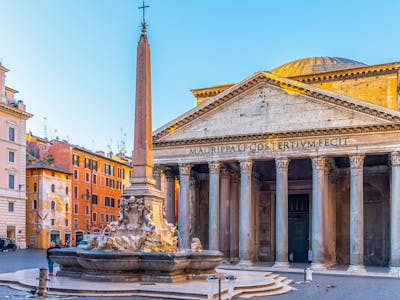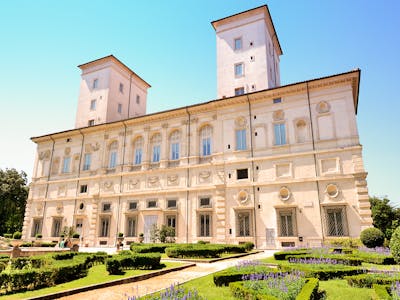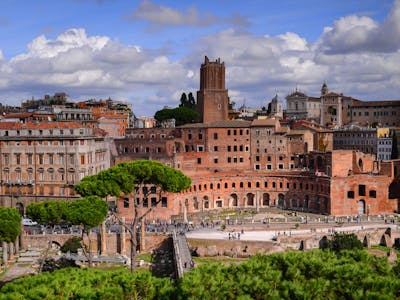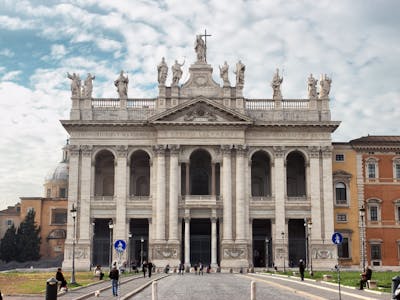As you wander through Rome's enchanting streets, you'll find yourself drawn to the iconic Trevi Fountain. This magnificent Baroque masterpiece, completed in 1762, is more than just a feast for your eyes—it's a portal to the Eternal City's rich history and culture. You'll be awestruck by its grandeur, especially when it's lit up at night. Legend has it that if you toss a coin over your shoulder into the fountain ensures your return to Rome. Featured in countless films, including Fellini's "La Dolce Vita," the Trevi Fountain is a UNESCO World Heritage Site that perfectly encapsulates Rome's artistic legacy.
Trevi Fountain - In A Nutshell
Things to Know
Constructed in: 1762
Location: Rome
Architect: Nicola Salvi
Architectural style: Baroque
Height of Fountain Statues: 24m (78 ft)
Width of Fountain Basin: 20m (66 ft)
Coins Thrown in the Trevi Fountain Each Day: 3000–4000
Opening Hours And Address
Daily, 24 hours
Address: Piazza di Trevi, 00187 Roma RM, Italy
Get Directions
Why Is Trevi Fountain Worth Visiting?
- One of the oldest fountains in Rome, it dates back to the 19th century.
- It acts as a perfect backdrop for a romantic evening or an unforgettable photo opportunity.
- Enjoy the magical atmosphere created by the fountain's blue-green waters, supplied by an ancient aqueduct.
- It is believed that throwing a coin into the fountain can bring good luck. Over €3,000 are thrown in daily.
- Admire the intricate carvings of mythical figures and animals, including the statue of Oceanus, God of the Sea.
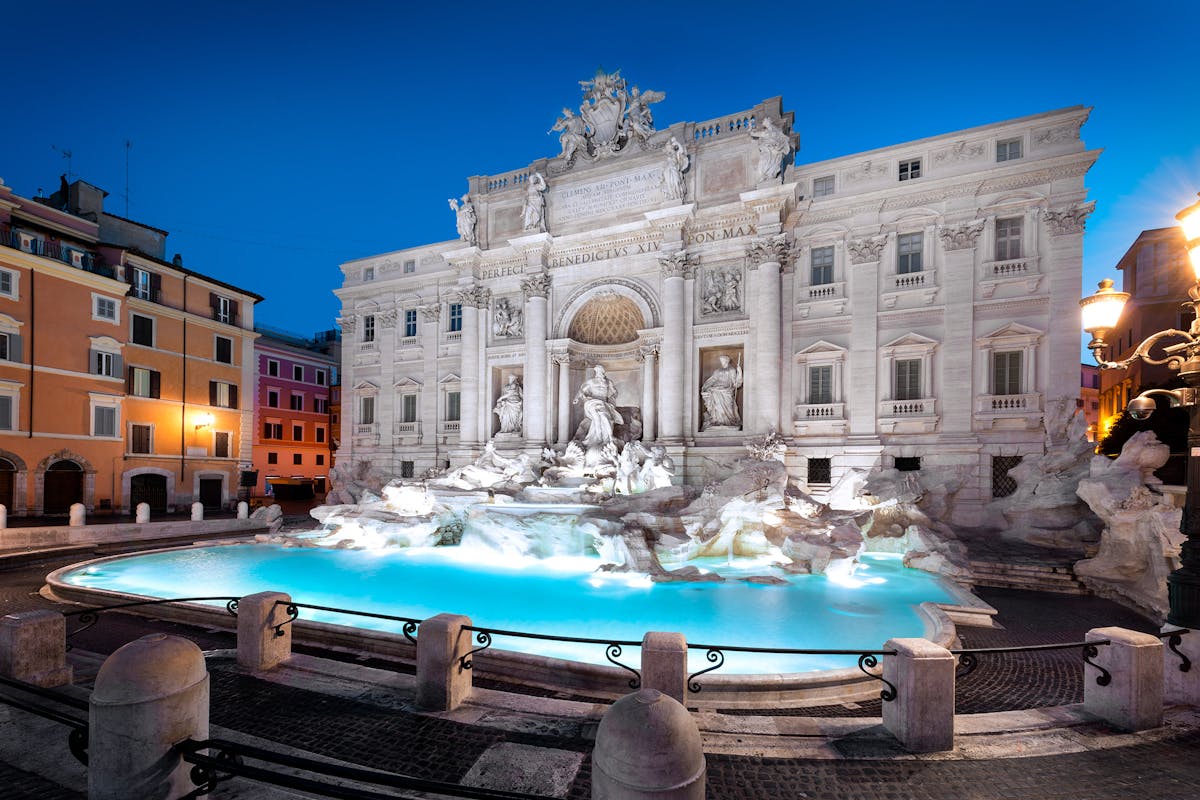
Trevi Fountain Tickets
You can choose from a variety of tours while visiting Trevi Fountain including a Guided Tour and an Audio Guided tour. You can also club your experience to visit some other iconic attractions such as the Spanish Steps and Piazza Navona.
History Of Trevi Fountain
The Trevi Fountain, designed by Nicola Salvi in 1762, marks the endpoint of the ancient Aqua Virgo aqueduct. Commissioned by Augustus in 19 BC, this aqueduct still supplies water to the fountain today. The name "Trevi" comes from "tre vie" or "three roads," referencing its location at a junction. Over centuries, the fountain has inspired artists like Bernini and Pietro da Cortona, and featured prominently in literature, art, and film, including Fellini's iconic "La Dolce Vita."
After the Gothic invasion in 537 AD, the aqueduct was abandoned for over a millennium. The fountain underwent major restorations in 1998 and 2013, with the latter sponsored by Italian fashion company Fendi. These efforts have preserved this magnificent Baroque masterpiece, ensuring it remains a symbol of Rome's artistic heritage and a must-visit destination for tourists from around the world.
Trevi Fountain Architecture
Designed by Italian architect Nicola Salvi, the fountain is a brilliant example of Baroque architecture, a style characterized by grandeur and ornamentation as depicted with its beautiful sculptures and detailed carvings.
The most interesting part of the Trevi Fountain is its main statue – Oceanus, God of Sea, riding on two sea horses, symbolizing the power of the ocean over land. Other features include Neptune’s chariot, a triton, and two Tritons riding sea horses. Another noteworthy feature is the use of travertine stone, a type of limestone that gives the fountain its distinctive cream color.
The Trevi Fountain is best seen in the evening when it is illuminated by the setting sun and its waters shimmer in the fading light. You'll be able to appreciate the intricate details and experience the magical ambiance of this iconic symbol of Rome.
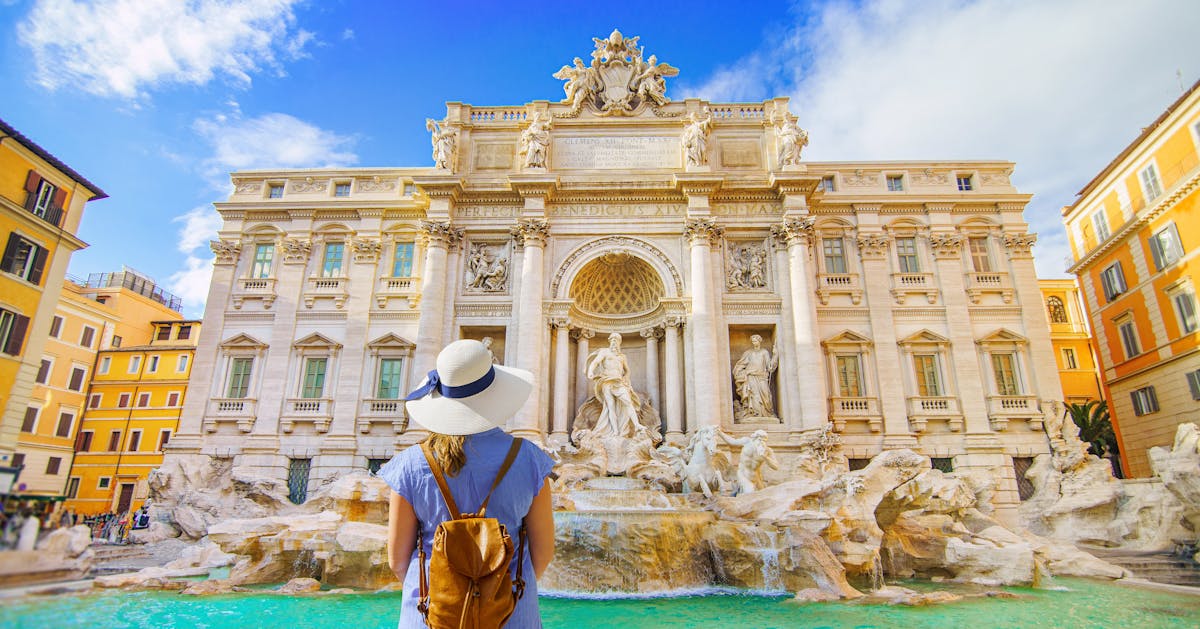
Highlights of the Trevi Fountain
1 Oceanus
The main statue in the Trevi Fountain is Oceanus, the god of the sea, riding on a pair of sea creatures and flanked by two Tritons. The intricate details of the statue are a testament to the exceptional skill of the sculptor, Pietro Bracci.
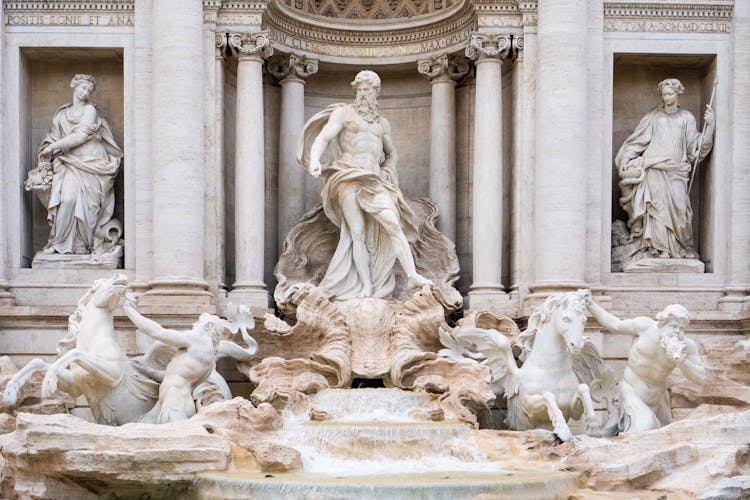
2Tritons
The Tritons, depicted as mermen blowing into their conch shells, are half-human, half-fish creatures believed to be the sons of Poseidon. The four Tritons at the fountain represent the four seasons, each blowing into their conch shells to symbolize the changing winds.
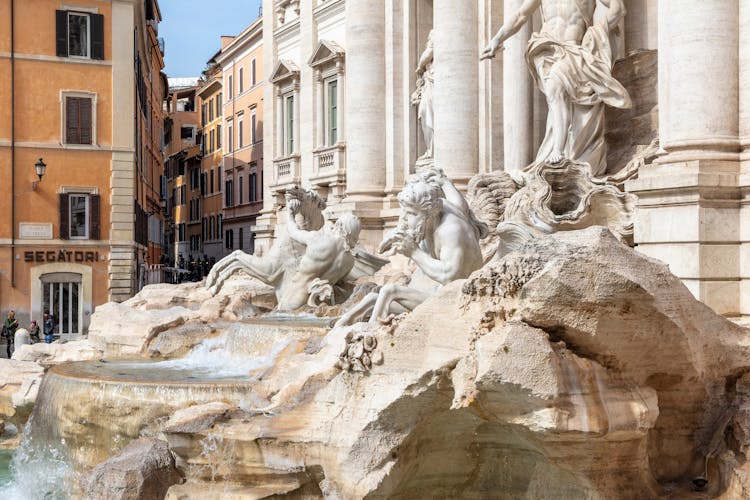
3 Ancient Aqueduct
The fountain's blue-green water is supplied by the ancient Aqua Virgo aqueduct, commissioned in 19 BC. It provided water to Rome for over 2,000 years. The aqueduct still operates today, supplying the fountain's blue-green water and creating the magical atmosphere that visitors can experience.
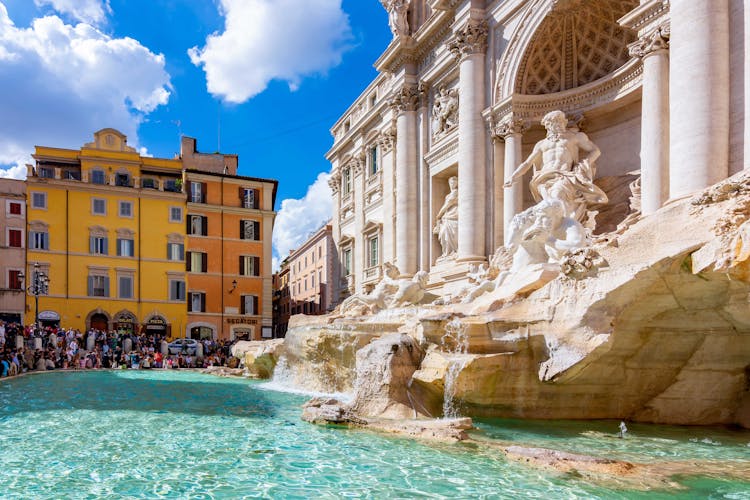
4Niches
The center of the Trevi Fountain features a triumphal arch, built on top of the Palazzo Poli facade. The central niche that frames Oceanus has free-standing columns that provide a play of light and shadow. On the niches flanking either side of Oceanus, you will see figures of mythological characters, Abundance and Salubrity. Above, you will find bas-reliefs that illustrate the Roman origin of the aqueducts.
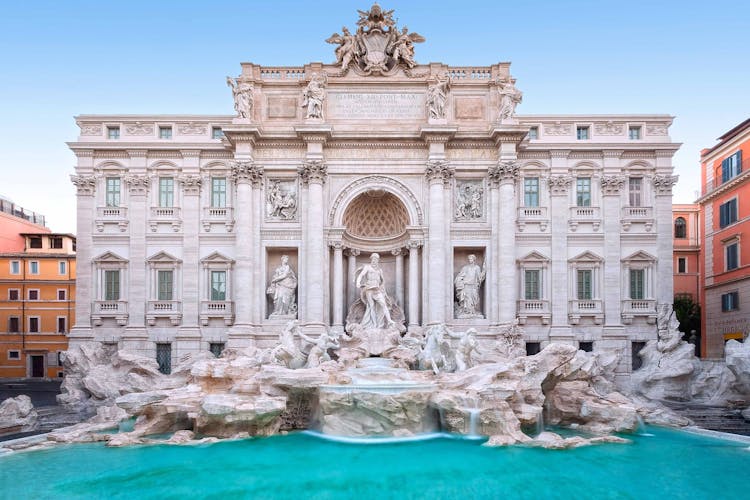
5 Piazza di Trevi
The piazza where the Trevi Fountain stands is one of the most beautiful and iconic squares in Rome. The bustling square is surrounded by charming cafes and restaurants making it a popular spot for tourists and locals alike.
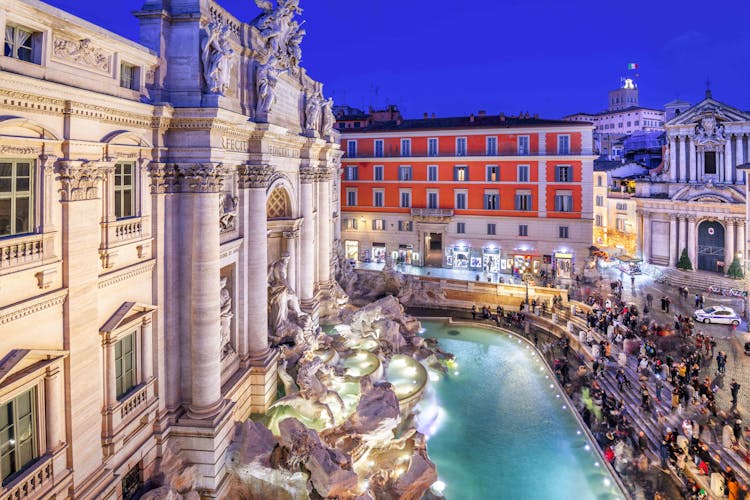
6Palazzo Poli
Built in the 16th century, the palace serves as the backdrop of the fountain. It is adorned with beautiful frescoes that depict various scenes from Roman mythology, including the story of Agrippa's construction of the Aqua Virgo aqueduct, which feeds the fountain.
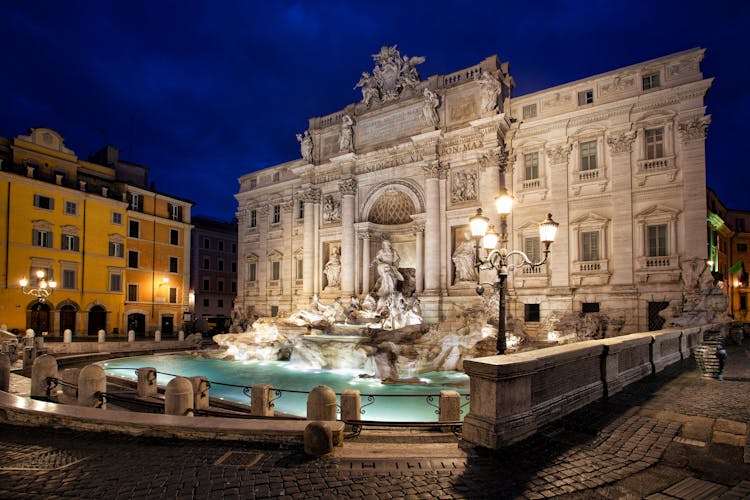
Best time to visit Trevi Fountain
The best time to experience Trevi Fountain is in the early morning, before 9am. At this hour, crowds are sparse and the streets quiet, allowing for a serene atmosphere. The soft morning light casts a unique glow on the fountain's intricate details. It's best to avoid midday and early evening hours (6:30pm - 8pm) when the area becomes congested with tourists and locals. While open year-round, weekdays offer a less crowded experience than weekends. For an even more tranquil visit, aim for Tuesdays through Thursdays, which typically see fewer visitors. Considering off-peak seasons can provide a more intimate experience. Winter visits offer the added charm of holiday decorations, enhancing the fountain's already impressive appearance.
Additionally, you can learn more about the Best time to visit Rome.
Trevi Fountain timings
The Trevi Fountain is open daily, throughout the year.
Getting There
- By Car: The closest parking lot is Autorimessa Belsiana. It is open 24x7.
- By Bus: C3, N5, N46, 51, 52, 53, 62, 63, 71, 80, 83, 85, N90, 100, 117, 119, 160, N201, 492 y N543.
Nearest Stop: L.go Chigi - By Train: RENFE
Nearest Stop: Passeig de Gràcia Station - By Metro: Line A
Nearest Stop: Barberini
The best recommended mode of transport to get to the Trevi Fountain is by metro, as it's the most convenient and efficient way to get there. Additionally, it's recommended to avoid driving to the fountain area, as parking can be difficult and expensive, and the streets can be crowded with both pedestrians and vehicles.
Insider Tips to Visiting Trevi Fountain
- Use Coins for Wishes: Throw three coins into the fountain, over your left shoulder with your right hand, making sure each one touches the water. Tradition dictates that doing this will bring you luck!
- Gain Historical Insights: While you take a close look at the fountain, don't miss out the bas-reliefs over the central niche of the fountain. They illustrate the Roman origin of the aqueducts and their construction.
- Explore the Neighborhood: Nearby attractions like Piazza di Spagna and Palazzo Poli are worth exploring for their own unique charm.
- Take a Tour: To get the most out of your visit, you can join one of the guided tours available in the area. The tour guides will give you interesting insights into the fountain's history and architecture.
- Find a Spot to Relax: Many locals gather around the Trevi Fountain during their free time, so take a seat and enjoy the peaceful atmosphere.
- Visit at Night: While it is recommended that you visit the fountain during early morning hours to avoid the crowds, visiting at night, when the fountain is lit up also makes for a unique and magical experience.
Interesting Facts About Trevi Fountain
- The Trevi Fountain is the largest Baroque-style fountain in Rome, measuring 26.3 meters (86 feet) high and 49.15 meters (161.3 feet) wide.
- The fountain is fed by the Aqua Virgo aqueduct, which is one of the oldest Roman aqueducts and has been providing water to Rome for over 2,000 years.
- It is estimated that around 3,000 euros are thrown into the Trevi Fountain every day, as the popular tradition holds that good luck awaits those who throw coins into it with their right hand over their left shoulder.
- A scene from Federico Fellini's rom-com La Dolce Vita was filmed at the Trevi Fountain. The fountain has been featured in other films, including Three Coins in the Fountain (1954) and Roman Holiday (1953).
- You will find a replica of the Trevi Fountain outisde the Caesar's Palace Shopping Center in Las Vegas.
Restaurants near Trevi Fountain

Located on the third floor of the Relais Fontana di Trevi Hotel, the Garden Roof Trevi is a Lounge Bar with a terrace that offers a stunning panoramic view of the Trevi Fountain. Guests can enjoy cocktails,and music, along wit the view.
Distance from Trevi Fountain: 51 m

This cozy little restaurant is perfect for a quick and delicious Italian sandwich or a charcuterie board. Perfect for aperitifs, lunch, or dinner, the food here is made from artisanal produce.
Distance from Trevi Fountain: 220 m

Enjoy an authentic Italian gastronomic experience through a menu that represents all Italian regions. The pizza here is made by fermenting the dough for 36 hours, resulting in a light texture with a unique flavor.
Distance from Trevi Fountain: 700 m

A rustic restauarant and wine bar, a few steps from Piazza di Spagna, the Antica Enoteca is a great place to enjoy an aperitif, or an intimate and romantic dinner. Dating back to 1726, it is believed to be considered with great probability the oldest wine shop in the city.
Distance from Trevi Fountain: 900 m

The award-winning pizzeria is a no-fuss eatery best known for its thin-crust pizzas. It also has an extensive menu of pasta and seafood dishes.
Distance from Trevi Fountain: 1.3 km
Hotels around Trevi Fountain
Other attractions around Trevi Fountain
FAQs
The Trevi Fountain is open daily, 24 hours a day.
Yes, guided tours of the Trevi Fountain are available, starting at Є29. You can also opt for an audio guided tour, which starts at Є 12.
It can take about 30-40 minutes to fully take in the Trevi Fountain in all its glory and explore the highlight features of the fountain closely. However, most people choose to stay longer and enjoy the ambiance of the area.
No, visitors are prohibited from swimming inside the Trevi Fountain. Offenders will be charged with a hefty fine.
While there are no laws against it, it is not advised that you drink from the fountain. The water that flows through the fountain is recycled to avoid wastage, which makes it undrinkable.

